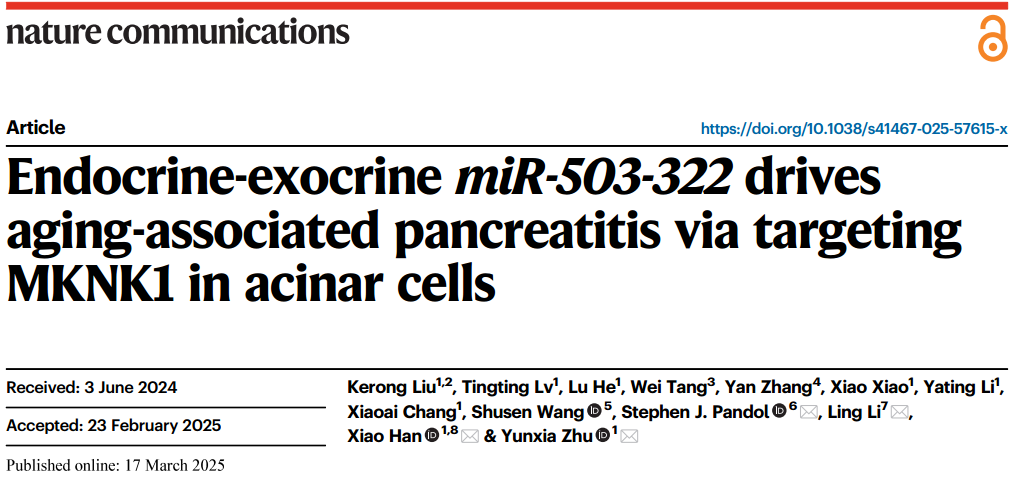Recently, the research team led by Professors Yunxia Zhu and Xiao Han from the School of Basic Medical Sciences at Nanjing Medical University, in collaboration with Professor Stephen J. Pandol from the University of California and Professor Ling Li from Zhangda Hospital,Southeast University, published a research paper in Nature Communications titled "Endocrine-exocrine miR-503-322 drives aging-associated pancreatitis via targeting MKNK1 in acinar cells". The study reveals that senescent β-cells release an increased number of small extracellular vesicles (EVs) enriched with miR-503-322. Theseβ-cell-derived EVs can travel to the exocrine pancreas, where they are absorbed by enzyme-secreting acinar cells, ultimately leading to the onset of pancreatitis. These findings provide novel insight into the high prevalence and severity of pancreatitis in elderly individuals and elderly diabetic patients.

Type 2 diabetes mellitus (T2DM) and pancreatitis are two prevalent pancreatic diseases. The former manifests as hyperglycemia caused by β-cell dysfunction in the endocrine pancreas, whereas the latter shows as an acute abdominal disorder caused by necrosis of acinar cells in the exocrine pancreas. These two diseases serve as risk factors for each other, with their incidence increasing with age. Long-term clinical observations have shown that aging may contribute to the onset of both diseases through a shared mechanism. However, the molecular basis underlying this association remains poorly understood.
Previously, a study by the same team has reported that under metabolic stresses such as obesity and aging, senescent β-cells could release miR-503-322 as small EVs into the blood circulation. These EVs transport miR-503-322 to peripheral target organs like the liver and adipose tissue, contributing to insulin resistance and the onset of T2DM (Diabetes, 2024). During this study, they serendipitously found that β-cell-specific overexpression of miR-503-322 promotes pancreatitis independently of insulin resistance and T2DM.
In the present study, the researchers demonstrated that miR-503-322 derived from endocrine β-cells promotes aging-associated pancreatitis by targeting MKNK1 in exocrine acinar cells. miR-503-322, produced by senescent β-cells, exerts an in situ effect in acinar cells that inhibits zymogen secretion and regenerative proliferation. In the elderly population, serum miR-503 concentration is negatively correlated with amylase levels. Moreover, human pancreatic slices also showed increased miR-503 expression and decreased MKNK1 levels in the elderly pancreas, indicating a predisposition to chronic pancreatitis.
In summary, this study uncovers a novel endocrine-exocrine regulatory pathway mediated by the miR-503-322–MKNK1 axis, providing a mechanistic explanation for the increased susceptibility to pancreatitis in aging and T2DM. These findings not only enhance our understanding of the pathogenesis of pancreatitis in elderly individuals and diabetic patients but also offer potential therapeutic targets for preventing and treating this condition.
Professors Yunxia Zhu and Xiao Han from NMU, Professor Stephen J. Pandol from the University of California, and Professor Ling Li from Zhongda Hospital served as co-corresponding authors of the study. The first author, Kerong Liu, was a Ph.D. candidate (class of 2019) at NMU. The research was supported by the National Natural Science Foundation of China, with significant contributions from Professor Wei Tang from Geriatric Hospital of NMU and Professor Shusen Wang from Tianjin First Center Hospital.
The original article link: https://doi.org/10.1038/s41467-025-57615-x
(Drafted by the research team led by Professors Zhu Yunxia and Han Xiao; Reviewed by Chen Feng and Wang Juejin; Translation revised by Zhang Bei)



